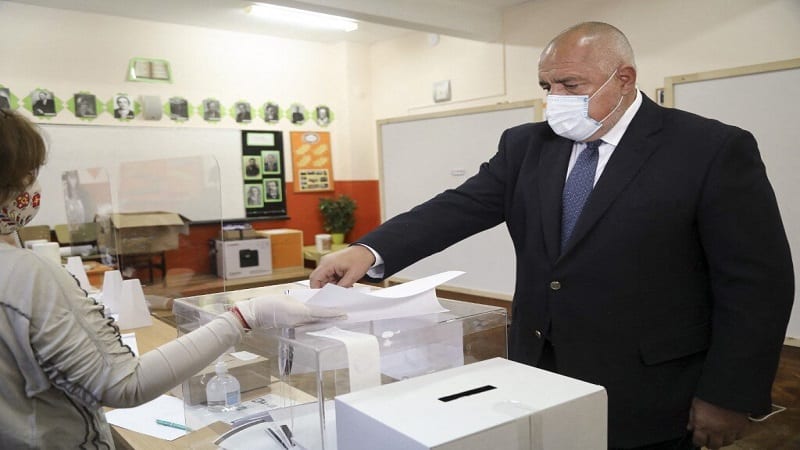Bulgaria’s Prime Minister Boyko Borissov will have difficulty holding onto power, after a surge of votes in an election on Sunday for anti-establishment and anti-corruption parties that want him out.
Exit polls showed Borissov’s centre-right GERB will be the largest party in the parliament, winning approximately 25 percent of the vote, compared with the 33.5 percent it won four years ago.
Behind it, a new anti-establishment party founded by a TV host and singer finished second with 17-17.5 percent and two other opposition groups that reject Borissov were also forecast to enter the parliament, taking over the opposition Socialists.
Reporting from the Bulgarian capital, Sofia, Al Jazeera’s Bernard Smith said if the exit polls were borne out it could lead to an “unprecedented situation” with the need for a coalition government.
“It could end up being some sort of limbo period as Bulgarian politicians try to work away through and see if they can establish some sort of government,” he said.
After 10 years of dominating Bulgarian politics, Borissov has few natural coalition partners in a fragmented legislature, with most groupings rejecting direct cooperation with GERB.
Weeks of talks, or even another election, cannot be ruled out, meaning Bulgaria may have difficulty tapping the EU’s 750-billion-euro ($884bn) Recovery Fund aimed at helping rebuild economies across the bloc after the coronavirus pandemic.
Speaking before official results were released, Borissov said GERB had won the vote and called on opposition leaders to consider a broad, expert government that would focus on bringing EU cash to the country battered by the coronavirus pandemic.
Such a government could have a limited life until December, Borissov said.
“I offer you peace. I offer you to put forward experts, to take responsibility,” he said in a video streamed on Facebook. “This is my proposal for all, enjoy the results for two, three days and then consider – what is stable and what is not.”
A former firefighter and bodyguard, Borissov, 61, sought to showcase his successes in modernising Bulgaria’s creaking infrastructure in a low-key campaign after huge anti-corruption rallies last year eroded his popularity.
“We are seeing the outlines of one new Bulgaria, where Borissov can continue to win elections with his huge administrative and financial resources, but cannot hold on to power,” said Hristo Ivanov, a leader of the anti-corruption Democratic Bulgaria party.
Complicating Borissov’s coalition-building options is the emergence of the anti-establishment There is Such a People party of popular TV host and singer Slavi Trifonov.
A Gallup International poll put Trifonov’s party in second place with 17.1 percent, but a poll by Alpha Research placed it third with 15.2 percent and the opposition Socialists second with 17.6 percent.
Trifonov, 54, whose concerts peppered with patriotic songs have attracted thousands, has ruled out governing with either GERB or the Socialists.
Democratic Bulgaria, one of the biggest forces in the enormous protests last summer, won some 10-11 percent, as did the Movement for Rights and Freedoms party, a traditional kingmaker largely supported by the country’s ethnic Turkish minority.
The protest party Stand Up! Mafia Out! and the nationalist VMRO party, which is GERB’s coalition partner, also look set to exceed the 4 percent threshold needed to enter parliament.
Turnout figures were being keenly watched for any indication that coronavirus infection fears could have kept some voters away, especially among the opposition Socialists’ older electorate. More than 6.7 million Bulgarians are eligible to vote.
Bulgaria ranks as the EU’s most corrupt member state according to Transparency International. A recent United States report on human rights also highlighted serious problems with judicial independence and media freedom in the country.
President Rumen Radev, who supported last year’s anti-government protests and has been a vehement critic of Borissov, said he had “voted against the destruction of the rule of law”.
“These elections are a step towards returning to normality,” he added.
First partial official results, usually expected late on Sunday night, might be delayed due to the introduction of machine voting along with the usual ballot-paper voting in the majority of big polling stations.
The central electoral committee is due to release the official results by Thursday.
Source: Al Jazeera






 WhatsApp us
WhatsApp us 

